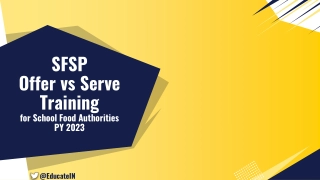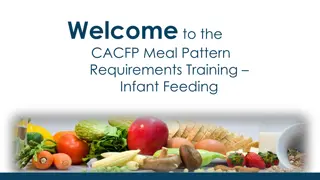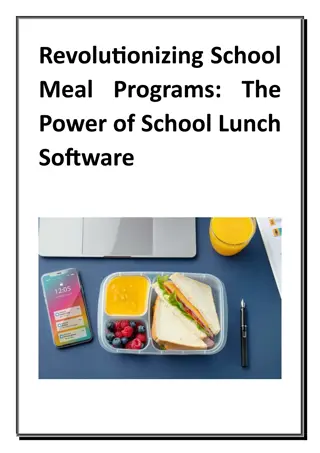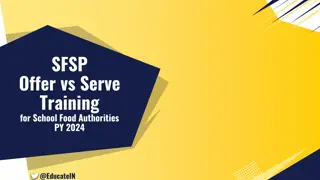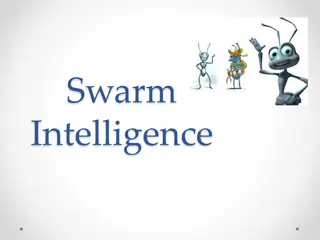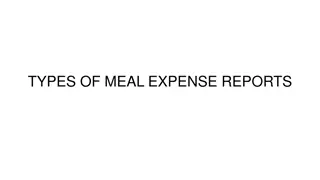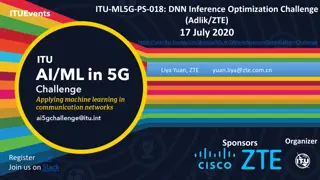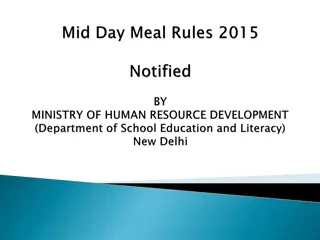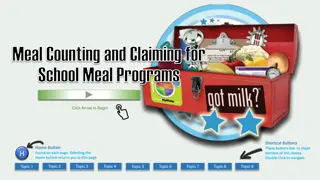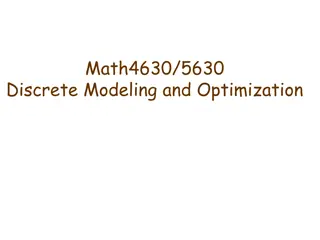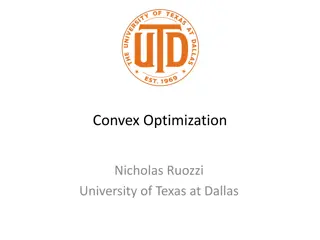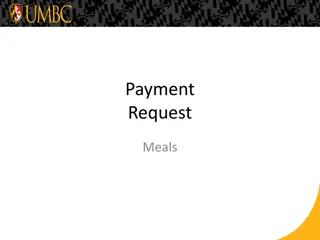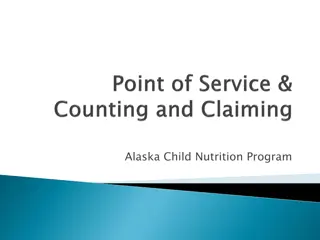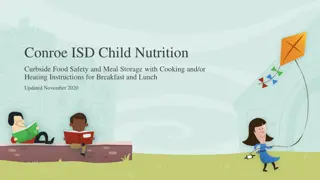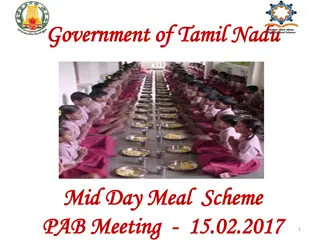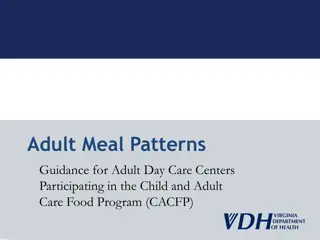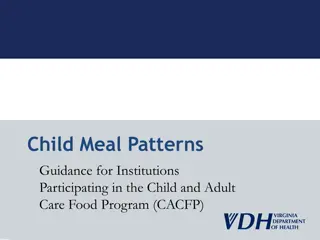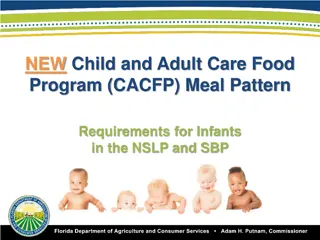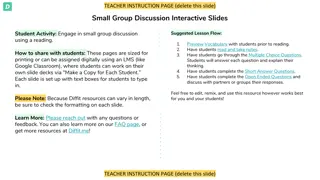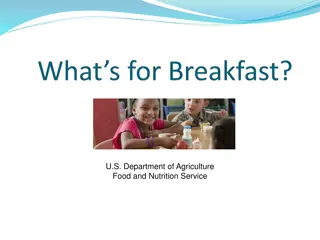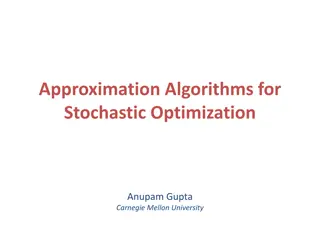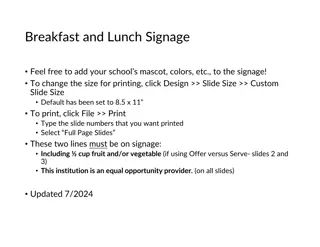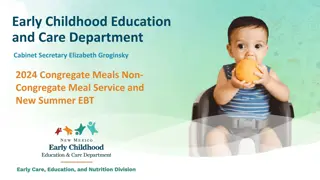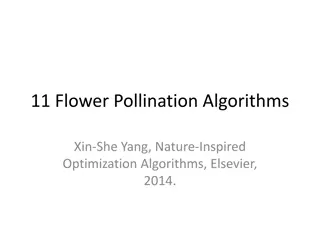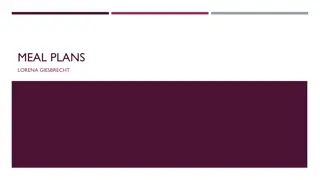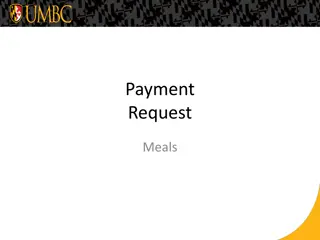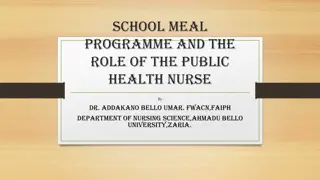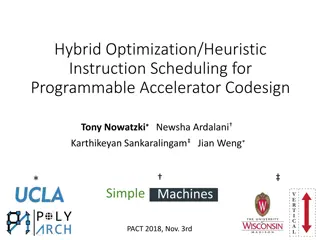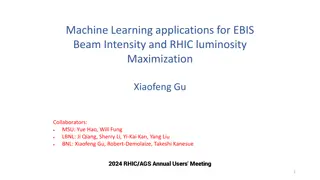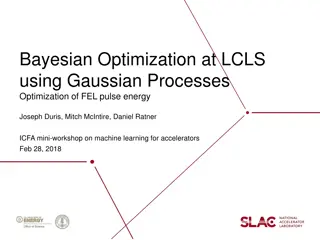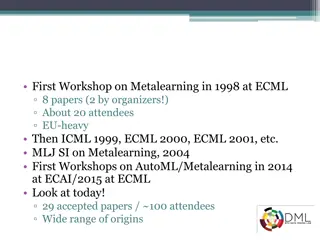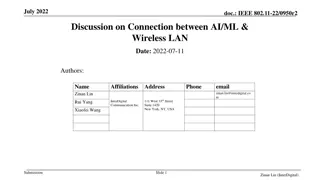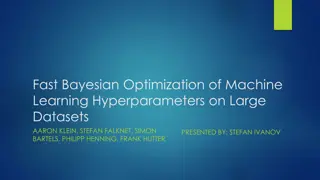Offer vs. Serve Training for School Food Authorities
Learn about Offer vs. Serve (OVS) meal service option for School Food Authorities, allowing children to decline some food items in reimbursable meals. Discover how OVS reduces food waste and costs with proper implementation. Training is essential for staff to assist children in selecting a reimbursa
1 views • 39 slides
Enhancing Query Optimization in Production: A Microsoft Journey
Explore Microsoft's innovative approach to query optimization in production environments, addressing challenges with general-purpose optimization and introducing specialized cloud-based optimizers. Learn about the implementation details, experiments conducted, and the solution proposed. Discover how
2 views • 27 slides
Introduction to Optimization in Process Engineering
Optimization in process engineering involves obtaining the best possible solution for a given process by minimizing or maximizing a specific performance criterion while considering various constraints. This process is crucial for achieving improved yields, reducing pollutants, energy consumption, an
10 views • 52 slides
CACFP Infant Feeding Meal Pattern Requirements Training Overview
The training material covers the Child and Adult Meal Pattern Requirements, emphasizing a wider variety of protein options, more fruits and vegetables, whole grains, and less added sugar and saturated fat. It details the Infant Meal Pattern Requirements, encouraging breastfeeding and promoting devel
2 views • 58 slides
Revolutionizing School Meal Programs - The Power of School Lunch Software
Are you ready to transform your school meal program? Discover the power of school lunch software and take the first step towards a more efficient and nutritious dining experience for your students. Contact us today to learn more and schedule a demo. Let's work together to revolutionize your school's
0 views • 4 slides
Understanding Offer Versus Serve (OVS) Training for School Food Authorities
Offer Versus Serve (OVS) is a meal service option available for approved School Food Authorities (SFAs) in the Summer Food Service Program (SFSP). OVS allows children to decline certain meal components, reducing food waste and costs when properly implemented. However, it is crucial to adhere to meal
0 views • 41 slides
Understanding Swarm Intelligence: Concepts and Applications
Swarm Intelligence (SI) is an artificial intelligence technique inspired by collective behavior in nature, where decentralized agents interact to achieve goals. Swarms are loosely structured groups of interacting agents that exhibit collective behavior. Examples include ant colonies, flocking birds,
2 views • 88 slides
Understanding Deminimus Meal Expense Reports
Deminimus meal expense reports play a crucial role in documenting and justifying meal expenses incurred in business settings. These reports cover various types of meals, such as local, entertainment, and deminimus events, outlining the guidelines and procedures for creating and documenting expenses.
0 views • 28 slides
DNN Inference Optimization Challenge Overview
The DNN Inference Optimization Challenge, organized by Liya Yuan from ZTE, focuses on optimizing deep neural network (DNN) models for efficient inference on-device, at the edge, and in the cloud. The challenge addresses the need for high accuracy while minimizing data center consumption and inferenc
0 views • 13 slides
Mid-Day Meal Rules 2015 under National Food Security Act
The Mid-Day Meal Rules 2015 under the National Food Security Act mandate that every child aged 6 to 14 attending school shall receive a nutritious meal free of charge. The rules specify the entitlement, preparation, and quality standards for meals served in schools. The State Steering-cum-Monitoring
0 views • 17 slides
Meal Counting and Claiming for School Meal Programs
Participants in this course will learn about the essential elements of an acceptable meal counting and claiming system for school meal programs. Topics covered include eligibility documentation, collection procedures, point of service meal counts, reports, claims for reimbursement, and internal cont
0 views • 21 slides
Understanding Discrete Optimization in Mathematical Modeling
Discrete Optimization is a field of applied mathematics that uses techniques from combinatorics, graph theory, linear programming, and algorithms to solve optimization problems over discrete structures. This involves creating mathematical models, defining objective functions, decision variables, and
0 views • 12 slides
Generalization of Empirical Risk Minimization in Stochastic Convex Optimization by Vitaly Feldman
This study delves into the generalization of Empirical Risk Minimization (ERM) in stochastic convex optimization, focusing on minimizing true objective functions while considering generalization errors. It explores the application of ERM in machine learning and statistics, particularly in supervised
0 views • 11 slides
Optimization Techniques in Convex and General Problems
Explore the world of optimization through convex and general problems, understanding the concepts, constraints, and the difference between convex and non-convex optimization. Discover the significance of local and global optima in solving complex optimization challenges.
0 views • 24 slides
Understanding Optimization Techniques for Design Problems
Explore the basic components of optimization problems, such as objective functions, constraints, and global vs. local optima. Learn about single vs. multiple objective functions and constrained vs. unconstrained optimization problems. Dive into the statement of optimization problems and the concept
0 views • 96 slides
UMBC Meal Request Guidelines
Navigate the meal request process at UMBC with ease. Explore meal policies, reimbursement details, pre-approval forms, and key requirements for catered events. Access training resources and find essential information on employee-only meal payments. Discover how to get reimbursed for meals involving
0 views • 18 slides
Alaska Child Nutrition Program: Meal Counting & Claiming Systems
Explore the Alaska Child Nutrition Program's guidelines on acceptable point of service counting and claiming systems, along with eligibility documentation, meal counts, and reimbursement procedures. Learn about acceptable meal counting systems and the importance of maintaining accurate records for f
1 views • 37 slides
Conroe ISD Child Nutrition Curbside Food Safety Guidelines and Meal Storage Instructions
The Conroe ISD Child Nutrition program provides crucial guidance on food safety practices, meal storage instructions, and heating guidelines for breakfast and lunch items. Parents are urged to ensure meal ingredients do not contain allergens. Proper storage, handling, and consumption timelines are o
3 views • 13 slides
Overview of Tamil Nadu Mid Day Meal Scheme
The Government of Tamil Nadu's Mid Day Meal Scheme provides hot cooked nutritious meals to over 46 lakh children in primary and upper primary schools. With 43,143 noon meal centers and 1,28,130 employees, the scheme aims to tackle child malnutrition and ensure regular meals for students. The scheme'
0 views • 23 slides
Adult Day Care Meal Patterns Guidance for CACFP Participation
Providing well-balanced meals is crucial for adult day care centers participating in the CACFP. The meal pattern requirements ensure menus meet nutritional needs, align with Dietary Guidelines for Americans, and offer appetizing variety. Components for breakfast, lunch, supper, and snacks must be in
0 views • 26 slides
Child Meal Patterns Guidance for CACFP Participants
Child Meal Patterns Guidance for Institutions in CACFP aims to ensure well-balanced meals for children, meeting nutritional needs and aligning with Dietary Guidelines. The program specifies components required for breakfast, lunch/supper, and snacks to qualify for reimbursement. Menu planners must c
0 views • 26 slides
New Infant Meal Pattern Requirements in the CACFP for NSLP and SBP
This training covers the new Infant Meal Pattern Requirements in the Child and Adult Care Food Program (CACFP) for infants in the National School Lunch Program (NSLP) and School Breakfast Program (SBP). It includes information on the regulatory process, implementation plan, two age groups for infant
1 views • 30 slides
Insights into Recent Progress on Sampling Problems in Convex Optimization
Recent research highlights advancements in solving sampling problems in convex optimization, exemplified by works by Yin Tat Lee and Santosh Vempala. The complexity of convex problems, such as the Minimum Cost Flow Problem and Submodular Minimization, are being unraveled through innovative formulas
1 views • 47 slides
Effective Strategies for Budgeting and Meal Planning
Explore vocabulary related to budgeting and meal planning, guiding students through the importance of reducing waste and saving money by utilizing staple foods and pantry items. Students will engage in interactive activities to reinforce key concepts and develop practical skills for cost-effective m
0 views • 20 slides
Overview of U.S. Department of Agriculture Food and Nutrition Service Meal Patterns
The U.S. Department of Agriculture Food and Nutrition Service implements meal pattern changes for school meals, including requirements for fruits, vegetables, grains, milk, and calorie limits. Changes in specific school years, such as offering only fat-free and low-fat milk, increasing whole grains,
0 views • 25 slides
Understanding School Policies on Unpaid Meal Charges
Explore the history, requirements, and communication of school policies related to unpaid meal charges, as mandated by the Healthy, Hunger-Free Kids Act of 2010. Learn about local meal charge policies, the importance of having a written policy, and the communication efforts required to ensure all ho
0 views • 16 slides
Approximation Algorithms for Stochastic Optimization: An Overview
This piece discusses approximation algorithms for stochastic optimization problems, focusing on modeling uncertainty in inputs, adapting to stochastic predictions, and exploring different optimization themes. It covers topics such as weakening the adversary in online stochastic optimization, two-sta
0 views • 33 slides
School Breakfast and Lunch Signage with Nutritious Meal Components
Customize your school's breakfast and lunch signage with the included food components for a nutritious meal. Choose from a variety of options including vegetables, grains, milk, meat/meat alternates, and fruits to ensure a balanced and healthy meal for students. The signs also remind that the instit
0 views • 5 slides
Meal Service Flexibility in Early Childhood Education and Care Department
The Early Childhood Education and Care Department, under Cabinet Secretary Elizabeth Groginsky in 2024, offers meal service flexibility including congregate and non-congregate meal options. Sponsors in good standing can operate non-congregate meal services and conditional sites may qualify for progr
0 views • 12 slides
Flower Pollination Algorithm: Nature-Inspired Optimization
Real-world design problems often require multi-objective optimization, and the Flower Pollination Algorithm (FPA) developed by Xin-She Yang in 2012 mimics the pollination process of flowering plants to efficiently solve such optimization tasks. FPA has shown promising results in extending to multi-o
0 views • 15 slides
Meal Plans and Policies Information by Lorena Giesbrecht
Discover all the essential information about meal plans, cancellation policy, rollover policy, and what you need to know before signing up. Learn how to check your meal card balance and where to go to enroll in a meal plan at Lorena Giesbrecht's facility.
0 views • 6 slides
UMBC Meal Policies and Reimbursements
UMBC meal policies cover various aspects such as meal approval forms, reimbursement guidelines, catering events, and per diem rates for faculty and staff. The policies ensure compliance with fiscal procedures and provide clarity on meal expenses for UMBC personnel and non-UMBC individuals. Proper do
0 views • 16 slides
Role of Public Health Nurse in School Meal Programmes
School meal programmes play a crucial role in improving the nutrition and health of children attending school. This article discusses the historical background, challenges, and implementation of school meal programmes globally, with a specific focus on Nigeria. It highlights the significance of prov
0 views • 46 slides
Hybrid Optimization Heuristic Instruction Scheduling for Accelerator Codesign
This research presents a hybrid optimization heuristic approach for efficient instruction scheduling in programmable accelerator codesign. It discusses Google's TPU architecture, problem-solving strategies, and computation graph mapping, routing, and timing optimizations. The technique overview high
0 views • 33 slides
Machine Learning Applications for EBIS Beam Intensity and RHIC Luminosity Maximization
This presentation discusses the application of machine learning for optimizing EBIS beam intensity and RHIC luminosity. It covers topics such as motivation, EBIS beam intensity optimization, luminosity optimization, and outlines the plan and summary of the project. Collaborators from MSU, LBNL, and
0 views • 23 slides
Bayesian Optimization at LCLS Using Gaussian Processes
Bayesian optimization is being used at LCLS to tune the Free Electron Laser (FEL) pulse energy efficiently. The current approach involves a tradeoff between human optimization and numerical optimization methods, with Gaussian processes providing a probabilistic model for tuning strategies. Prior mea
0 views • 16 slides
Exploring Metalearning and Hyper-Parameter Optimization in Machine Learning Research
The evolution of metalearning in the machine learning community is traced from the initial workshop in 1998 to recent developments in hyper-parameter optimization. Challenges in classifier selection and the validity of hyper-parameter optimization claims are discussed, urging the exploration of spec
2 views • 32 slides
AI/ML Integration in IEEE 802.11 WLAN: Enhancements & Optimization
Discussing the connection between Artificial Intelligence (AI)/Machine Learning (ML) and Wireless LAN networks, this document explores how AI/ML can improve IEEE 802.11 features, enhance Wi-Fi performance through optimized data sharing, and enable network slicing for diverse application requirements
0 views • 11 slides
Fast Bayesian Optimization for Machine Learning Hyperparameters on Large Datasets
Fast Bayesian Optimization optimizes hyperparameters for machine learning on large datasets efficiently. It involves black-box optimization using Gaussian Processes and acquisition functions. Regular Bayesian Optimization faces challenges with large datasets, but FABOLAS introduces an innovative app
0 views • 12 slides
Understanding Price Optimization in Auto Insurance Markets
This presentation delves into the concept of price optimization in the auto insurance industry, covering actuarial, economic, and regulatory aspects. It addresses the controversy surrounding price optimization, various state definitions, concerns, and the use of sophisticated tools to quantify busin
5 views • 29 slides
